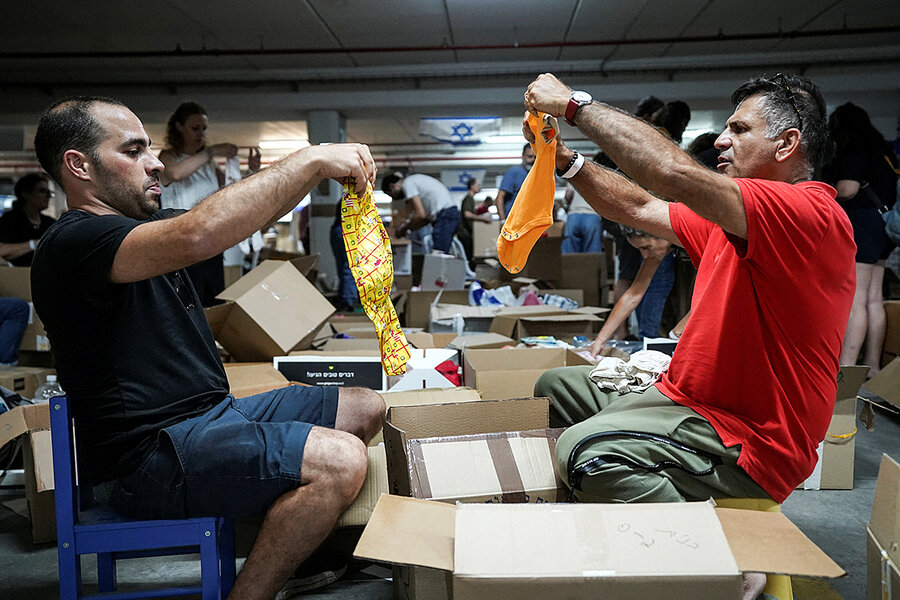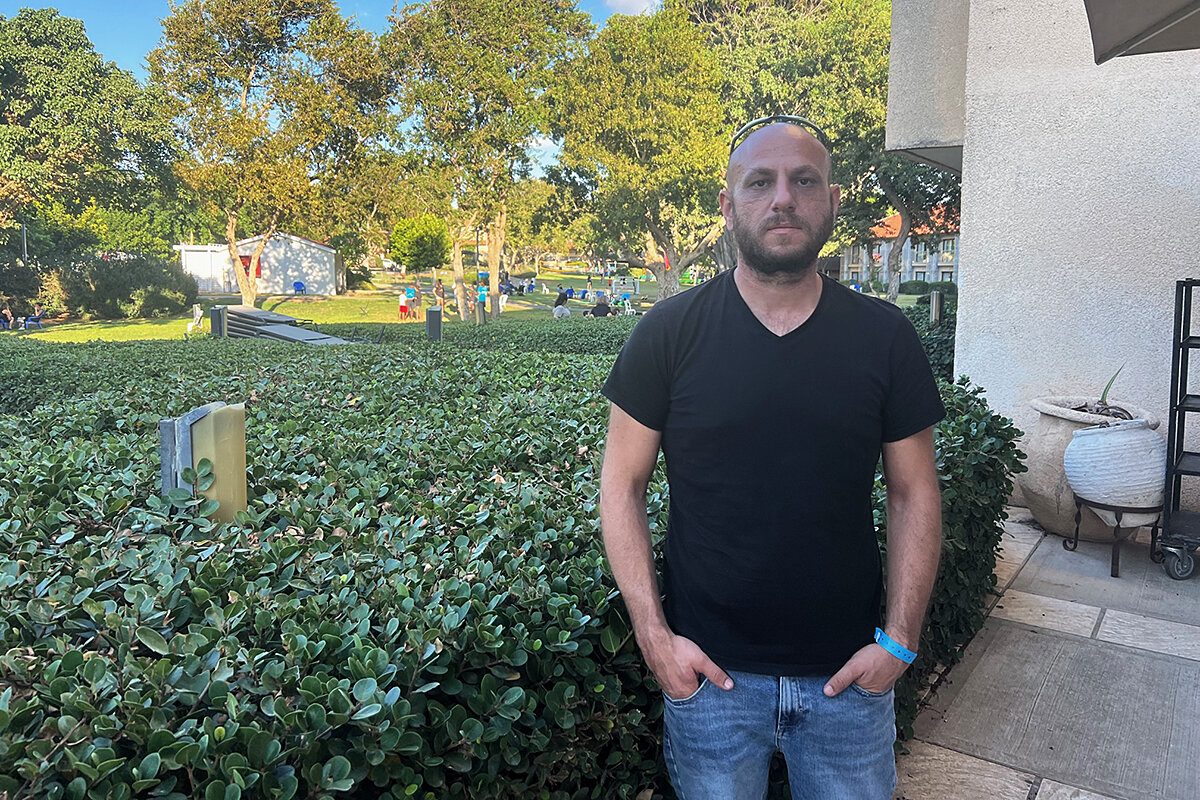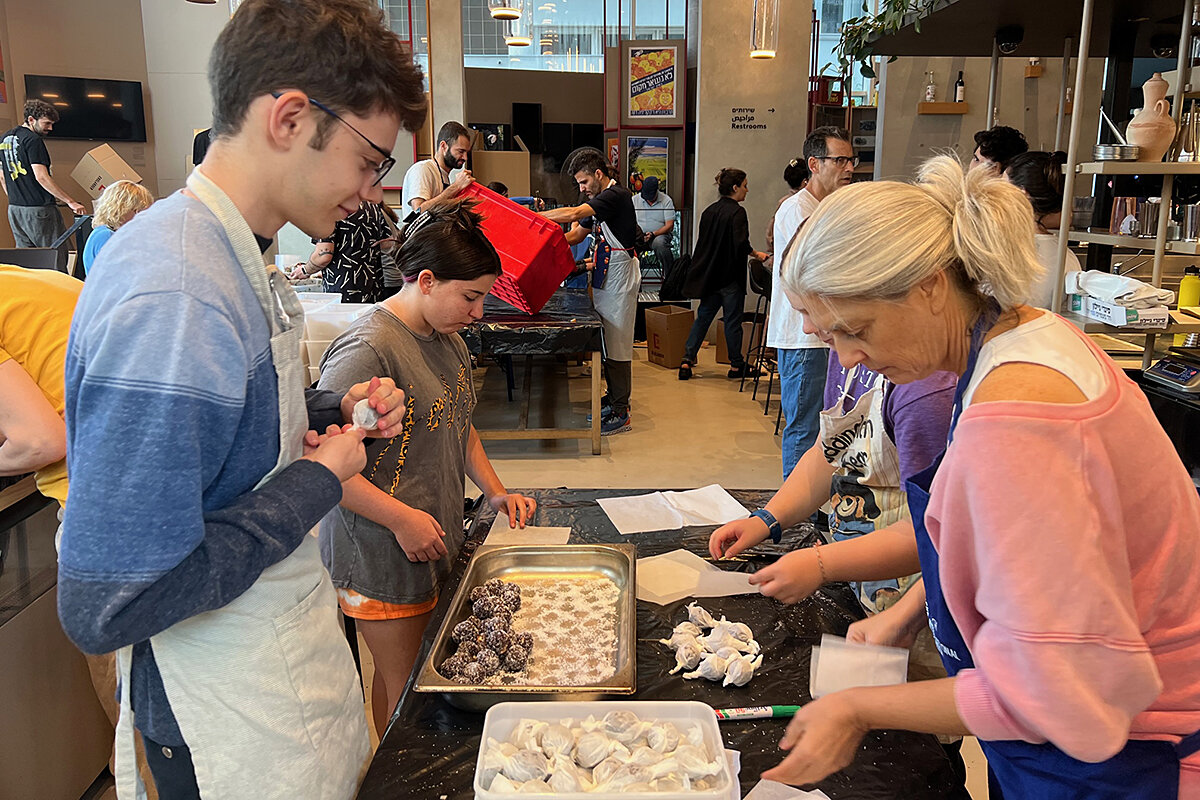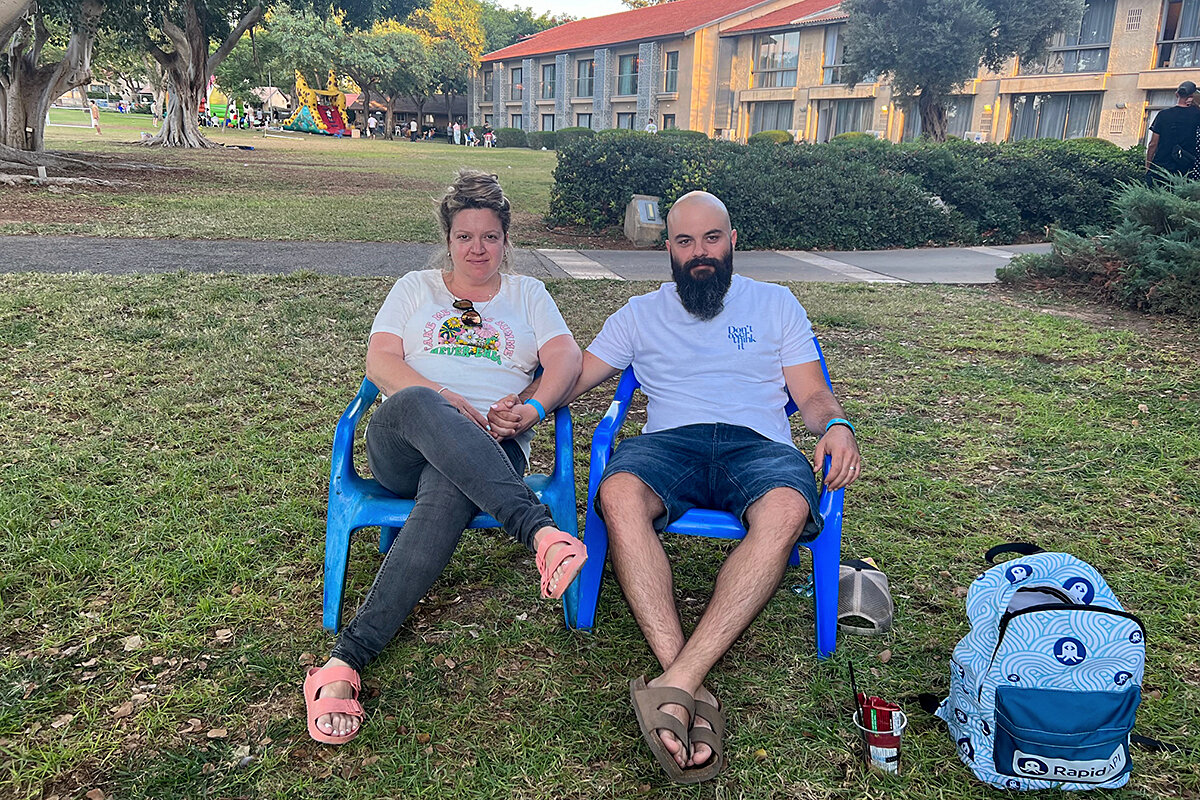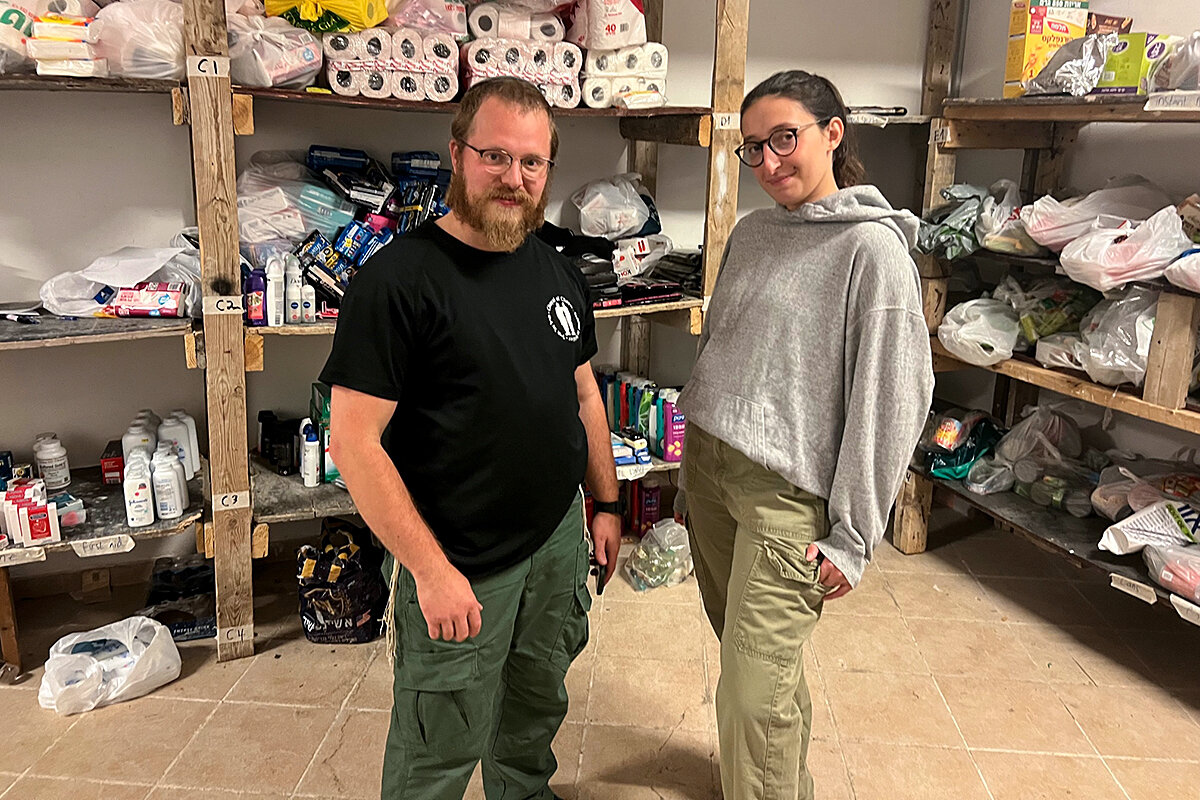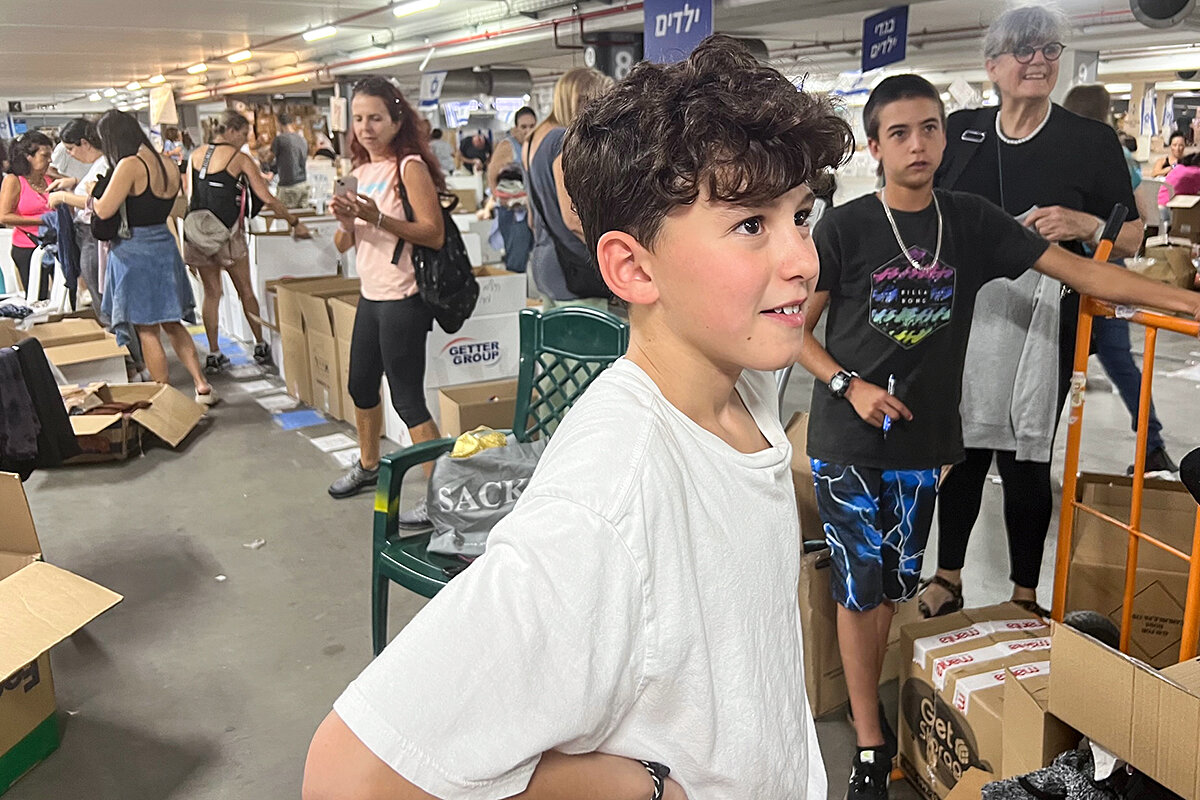In Israel, army of ‘can do’ volunteers fills void left by government
Loading...
| TEL AVIV, Israel
Israeli civil society has mobilized in the wake of the Hamas attack. Startups from Israel’s tech sector have helped track down those missing and reunite families. Networks connect evacuees with temporary housing in hotels, vacant apartments, and private homes.
Restaurants from humble kebab houses in Jerusalem to those of the top chefs in Tel Aviv’s trendy food scene are turning out thousands of meals a day. And reservists and organizations that succored Israel’s powerful pro-democracy movement this year quickly shifted to helping fellow citizens at a moment of excruciating loss.
Why We Wrote This
A story focused onFrom supplying soldiers to housing and feeding those displaced by the Hamas attack, Israeli civilians have mobilized at a moment of profound loss.
And very often this all-hands-on-deck mobilization of civil society and the private sector is highlighting a glaring government absence – prompting many Israelis to foretell deep political repercussions in the years ahead.
“What you hear everywhere is a deep sense of abandonment and government incompetence,” says Nimrod Novik, Israel fellow at the Israel Policy Forum, a U.S.-based think tank.
“In a very short time we had a civil society ... that replaced the government where the government doesn’t exist and began providing essential services,” he adds. “All this experience and technology ... will be put to use in a postwar protest movement determined to get rid of all those responsible for us reaching this very dire point.”
As he recounts the horrors he and his family witnessed at their home in Kfar Aza, a kibbutz along the border with the Gaza Strip, Maor Moravia puts the thumb and index finger of one hand to his eyes, as if to blot out what they have seen.
But then the web programmer wipes his eyes and surveys the sunny garden, the children playing, the food and clothing free for the taking, all arrayed before him at his family’s temporary home at the Shefayim Kibbutz Hotel north of Tel Aviv.
“The people of Israel are great; they cradle us with a lot of love,” he says. “We will always, always be so grateful for what they are doing for us.”
Why We Wrote This
A story focused onFrom supplying soldiers to housing and feeding those displaced by the Hamas attack, Israeli civilians have mobilized at a moment of profound loss.
Mr. Moravia and his wife and two children are the beneficiaries of an outpouring of support and care that Israel’s civil society mobilized within hours of the devastating Hamas terrorist attack Oct. 7 that left more than 1,400 people dead.
Organizations that succored Israel’s powerful pro-democracy movement this year, while also recognized for innovative humanitarian work outside Israel, quickly shifted to helping fellow citizens at a moment of excruciating loss.
Startups from the country’s vibrant tech sector have put their know-how to work tracking down those missing and reuniting families. Networks have sprung up to connect evacuees from around the Gaza and Lebanon borders with temporary housing in hotels, vacant apartments, and private homes.
Restaurants from humble kebab houses in Jerusalem to those of the top chefs in Tel Aviv’s trendy food scene are turning out thousands of meals a day for delivery to shelters, schools, and hotels-turned-refuges, including at Kibbutz Shefayim.
And very often this all-hands-on-deck mobilization of civil society and the private sector is highlighting a glaring government absence – prompting many Israelis to foretell deep political repercussions in the years ahead.
“We had nine months prior to this trauma where confidence in the government eroded to unprecedented levels, and then we had this. And now what you hear everywhere is a deep sense of abandonment and government incompetence,” says Nimrod Novik, Israel fellow at the Israel Policy Forum. The U.S.-based think tank promotes a two-state solution to the Israeli-Palestinian conflict that guarantees Israel’s security.
“In a very short time we had a civil society, the core of which is the younger generation, that replaced the government where the government doesn’t exist and began providing essential services,” he adds. “All this experience and technology being so visibly applied today will be put to use in a postwar protest movement determined to get rid of all those responsible for us reaching this very dire point.”
For the more charitably minded and cautious among civil society leaders, their work has freed up the government to focus on what everyone assumes is an imminent ground invasion of Gaza aimed at destroying Hamas.
But for the more critical, the government’s ineptitude at meeting average citizens’ needs in a crisis is the outcome of a coalition put in place more to protect Prime Minister Benjamin Netanyahu from judicial pursuit than to provide effective government services.
“A culture of corruption deformed the selection of who would serve in the key ministries, and that resulted in cronies of the prime minister rather than professionals and the most qualified being named to deliver essential services,” says Josh Drill, a leader in the pro-democracy movement, which has led opposition to the Netanyahu government’s proposed judicial overhaul.
“Then we have the most horrific experience in Israel’s history,” he adds, “and it’s the protest movement that is applying its muscle to do what the government should be doing but is apparently incapable of doing.”
The sense of government abandonment is a recurring theme among Israelis who were most directly touched by the attack.
“We’ve been here for exactly one week, and we have never seen one representative of the government,” says Nadiv Nassi, who with his wife, Viki, was evacuated from Kfar Aza and directed to the Shefayim hotel.
Asked if the army evacuating them to safety wasn’t the government in action, the couple respond with an emphatic “no.”
“We don’t count the army as part of the government, or I should say the coalition government [of Mr. Netanyahu],” Viki Nassi says. “The army is brave kids who are out there trying to keep us safe.”
Initiatives small and large
Some of the efforts to help Israelis in need are spontaneous pop-ups, some offshoots of long-established organizations. And they range from small individual gestures to large complex operations.
For two decades, IsrAid has been applying what the humanitarian organization calls “Israeli innovation and can-do spirit” to crises overseas, from earthquakes and hurricanes to conflict-driven internal displacement.
The events of Oct. 7 changed that.
“As we all watched these terrible events, it became clear that for the first time in 22 years we were going to launch a mission inside Israel itself,” says Shachar May, press officer at IsrAid. “With this crisis we saw that it was time to bring our expertise home.”
The group quickly set up training sessions for volunteers; mental health services for experts working with the families of the dead, missing, and hostages; and safe places for traumatized children to just play or talk out frightening memories.
Some initiatives are focused on getting soldiers coveted supplies that are in short supply.
In a donated space in the basement of his apartment building on Jerusalem’s Jaffa Street, Mordechai Botnick collects supplies ranging from socks and protective vests to toiletries and energy snacks for the thousands of soldiers who don’t have family in Israel to depend on.
About half are army reservists who in the past 10 days have returned to Israel from homes and jobs overseas to help secure the country and fight Hamas.
“We provide everything from underwear to a hug if that’s what’s needed,” says Mr. Botnick, himself a reservist who started Chayal el Chayal, or “Soldier to Soldier,” about a decade ago.
After Oct. 7, the organization ramped up to find protective vests for reservists arriving without one. Donations have poured in from the United States, France – and just down the street, he says.
Brothers in Arms
His basement mission is dwarfed by huge operations in Tel Aviv that have sprung up overnight, fueled by a steady stream of volunteers seeking to do anything to serve their compatriots.
At the city’s vast Expo convention center, the Brothers in Arms organization of army reservists that emerged in the pro-democracy movement has taken over a full floor of an underground garage. The mission: to receive, sort, and prepare for delivery donated supplies, from household goods and clothing to books, school materials, bicycles, and toys.
The volunteers range from the retired to the very young.
“I’m doing this for my country; I’m doing this for Israel,” says Jonathan Shwerling, a tween busy boxing up supplies for imminent delivery.
For some workers at Expo, the point of the operation is to free the government to focus on security.
“We are bringing together the people who can handle the civilian issues so that the government can do what it does, which is to fight a war,” says Terry Newman, a spokesperson for Brothers in Arms and a reservist who otherwise is a developer of hospitals.
“What we’re seeing here is confirmation that often the worst of things brings out the best in people,” he says.
That truism is on display at the Asif Culinary Institute of Israel in central Tel Aviv, where volunteers are working under the direction of some of the city’s most celebrated chefs to deliver thousands of meals to newly displaced people, to kids cut off from school lunches, and to older people who no longer have a community center to count on for meals.
And it’s not just sustenance that Asif aims to provide.
“We want the thousands of meals we are delivering in a week to serve as comfort for the soul,” says Chico Menashe, director of Asif, a joint venture between the New York-based Jewish Food Society and Start-Up Nation Central, an Israeli nonprofit. “That’s why all of the dishes we prepare are homey style, tasty like what people might make for themselves at home.”
“Civilian power”
Mr. Menashe says he’s still a little amazed to think that just two weeks ago, the institute was focused on refined culinary arts – but now, here it is providing physical and spiritual sustenance for thousands.
That transition, he says, was made possible by what he describes as “the new Israeli civilian power” that blossomed from the mass-participation anti-government protests.
“We’re seeing already how this new civilian power is going to change the way things get done in Israel,” he says.
“When very good people recognize a vacuum in the response of the state, they don’t go out and protest that the state isn’t doing what it should. They act,” he adds. “That’s the new Israeli DNA.”




